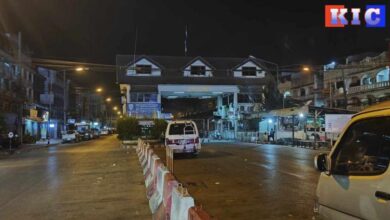Vaccination Drive Limited by Uncooperative Parents at Myaing Gyi Ngu IDP camp

Karen State health officials this week completed the third and final round of vaccines for children living at an internally displaced persons camp, but were unable to inoculate everyone due to uncooperative parents, health officials said.
Around 400 children under five at the Myaing Gyi Ngu Internally Displaced Persons (IDP) camp were inoculated against tuberculosis, tetanus, chickenpox, diphtheria, pertussis, hepatitis B, pneumococcal disease, German measles and polio, according to the Karen State Department of Health.
The vaccine drive was jointly undertaken by the Kawthoolei Department of Health and Welfare and the Karen State Department of Health.
“The displaced children had never been vaccinated before. This is the third time we cooperated with the KDHW to administer vaccines to protect [the children] against ten diseases,” Dr Naing Naing Tun, deputy director of Kayin State’s Expanded Program on Immunization, said on September 6.
The two health departments started the vaccine drive in July.
But according to Dr Naing Naing Tun, the project did not achieve 100 percent coverage as some parents did not cooperate.
“Over 100 children are left without vaccines. The health workers visited the homes to persuade [the parents]. They drove around to invite [the parents]. But they still did not accept vaccines as they are afraid their children will become sick if they get vaccinated,” she said.
In addition to vaccinations, the two health departments gave the IDPs rice, and in conjunction with Save the Children and the International Committee of the Red Cross, provided medicine and nutritional supplements to children and mothers. Around 5,000 displaced people live in the Myaing Gyi Ngu camp.
After the Karen National Union signed the nationwide ceasefire agreement n 2015, the KDHW has been cooperating with the government’s Department of Health on vaccinations and anti-tuberculosis and anti-malaria programs.
The joint vaccine program began in 2016 and has covered 93 village in Hpa-an, Hlaingbwe and Kya-in Seikkyi townships. It will be extended to cover Myawady and Kawkareik townships next, according to the Karen State Department of Health.




